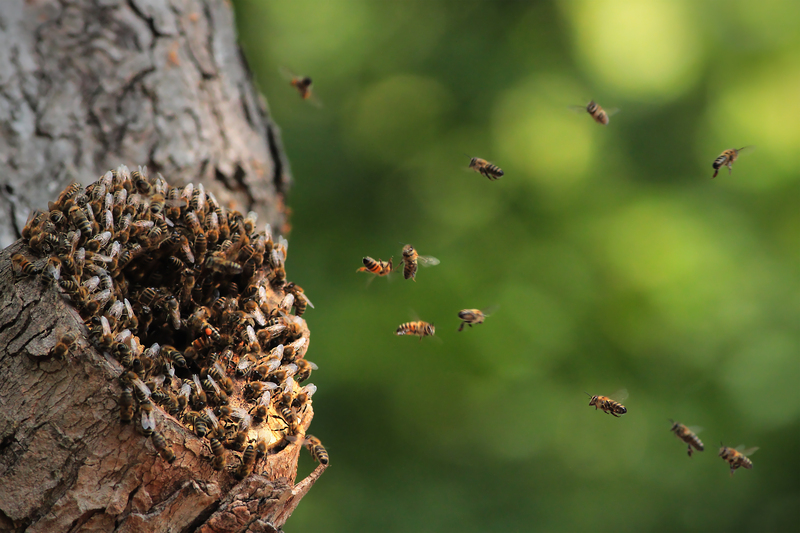Waste Not: Enhancing Soil Quality Organically
Posted on 18/08/2025
Waste Not: Enhancing Soil Quality Organically
In a world increasingly concerned with sustainable agriculture and environmental preservation, the movement towards enhancing soil quality organically is gaining momentum. The concept of "waste not, want not" is more relevant today than ever before, especially in the context of soil management. Utilizing organic methods to boost the health and productivity of soils not only improves crop yield but also supports the broader sustainability of ecosystems. This article delves into practical, proven, and eco-friendly ways to reclaim, replenish, and revitalize your soil using organic principles--turning what many consider 'waste' into vital, living assets for your garden or farm.

Understanding Soil Quality and Organic Enhancement
Soil quality encompasses its physical, chemical, and biological properties, all of which influence plant growth and sustainability. Healthy soil is teeming with beneficial microbes, features good texture and drainage, and supplies essential nutrients to plants. Enhancing soil quality organically means working with nature--not against it--by leveraging plant and animal materials, microbial activity, and natural cycles instead of synthetic fertilizers and chemicals.
Why Focus on Organic Soil Improvement?
- Environmental health: Organic methods reduce pollution and chemical runoff, protecting surrounding ecosystems and water sources.
- Long-term fertility: Organic matter builds up the nutrient reservoir in soil, nourishing crops sustainably over time.
- Resilience: Organically-managed soils are more resistant to drought, disease, and erosion.
- Economic viability: Organic options often utilize on-farm or locally sourced waste, reducing costs.
Incorporating organic techniques is a win-win for both soil and steward, ensuring productivity and ecological balance.
Practical Approaches to Enhancing Soil Quality Organically
Wondering how to improve soil organically? Below are several comprehensive and practical methods to improve soil quality naturally:
1. Composting: Turning Waste Into Black Gold
Composting is perhaps the most iconic method of enhancing your garden soil organically. By transforming kitchen waste, garden trimmings, and other organic matter into rich compost, you inject life-giving nutrients and beneficial microorganisms back into your soil.
- Build a pile: Alternate layers of green (nitrogen-rich) and brown (carbon-rich) materials--think fruit/veggie scraps, coffee grounds, grass clippings, dry leaves, straw, and cardboard.
- Maintain moisture and aeration: Keep your compost damp but not soggy, and turn it periodically to supply oxygen.
- Finish and apply: In 3-12 months, when dark and crumbly, spread compost over your beds as a mulch or soil amendment.
Benefits: Compost improves texture, increases nutrient content, and boosts the diversity of soil microbes. It even acts as a sponge, enhancing your soil's water retention capacity.
2. Green Manures and Cover Crops
Planting cover crops is a centuries-old technique for restoring organic matter to depleted soils. Green manures--such as clover, vetch, rye, or mustard--are grown during off-seasons, then chopped and worked into the earth before they flower.
- Choose crops wisely: Select legumes to fix nitrogen, grasses for biomass, or a mix for biodiversity.
- Timing: Sow after harvest, or between cash crops, mow before seeding, and till into soil for best effect.
- Prevent erosion: Their roots anchor soil and smother weeds in fallow periods.
Advantages of Cover Cropping: Replenishes nutrients, enhances soil structure, reduces erosion, and fosters beneficial soil organisms.
3. Mulching: Conserving Moisture and Feeding the Soil
Applying an organic mulch layer is one of the easiest ways to improve soil organically. Materials like straw, shredded leaves, grass clippings, wood chips, or even partially finished compost serve as mulch.
- Insulates the soil: Mulch Shields soil against extreme temperatures and minimizes water loss through evaporation.
- Suppresses weeds: Blocks light from reaching weed seeds, reducing their germination.
- Adds organic matter: As mulch breaks down, it slowly feeds your soil--improving fertility and texture.
Tip: Apply mulch 2-4 inches thick, keeping it a few inches from plant stems to prevent rot.
4. Rotational Planting and Polyculture
Crop rotation is a traditional technique that recharges soil and disrupts pest and disease cycles organically. By alternating plant families each season, you prevent specific nutrient depletion and reduce the buildup of soil-borne problems.
- Plan rotations: Rotate heavy feeders (tomatoes, corn), moderate feeders (root crops), and light feeders (beans, peas) in sequence.
- Diversify plantings: Mixed planting or polyculture mimics nature, supporting a balanced microbial community and reducing pest outbreaks.
*Why Rotate? Improves nutrient management and soil health while decreasing reliance on pesticides and fertilizers.*
5. Incorporating Animal Manures
Manures from animals are a rich, natural source of nitrogen, phosphorus, and potassium--critical plant nutrients. When composted, they supercharge soil, promoting robust crop growth.
- Compost first: Fresh manure can harbor pathogens and weed seeds. Composting stabilizes nutrients and kills undesirable organisms.
- Integrate carefully: Apply well-rotted manure in the off-season or as a side-dressing; avoid direct contact with leaves or edible crops.
*Note: Use manure from herbivores (chickens, cows, horses, rabbits) rather than meat-eaters, and always compost before use!*
Key Strategies for Organic Soil Management
Enhancing soil organically requires ongoing stewardship and observation. Here are core strategies to accelerate your journey to richer, more fertile earth:
1. Reduce Soil Disturbance
Over-tilling destroys soil structure and disrupts microbial networks vital for plant health. No-till or low-till gardening maintains soil aggregates, preserves moisture, and protects beneficial fungi (like mycorrhizae).
- Minimize tillage to necessary occasions (e.g., initial bed prep).
- Use broadforks or hand tools to aerate without inversion.
2. Feed the Soil Web
Soil is alive! Organic mulches, composts, worm castings, and manure nourish the web of life underground. Encourage diversity by adding a variety of organic amendments rather than relying on a single source.
3. Test and Amend As Needed
Regular soil testing helps you monitor pH, organic matter levels, and major nutrient content. Amend with lime, rock phosphate, greensand, or plant-based fertilizers according to your soil's unique needs--always opting for natural/mineral sources.
4. Practice "Waste Not" in the Garden
- Recycle lawn clippings as mulch or compost.
- Save autumn leaves for leaf mold or beds.
- Collect coffee grounds, eggshells, and vegetable trimmings for your compost bin.
- Use cardboard/newspaper as weed barriers beneath mulch layers.
*Turning organic waste into soil amendments is not only sustainable but economical, closing the loop within your own space.*
Specialty Organic Soil Enhancers
In addition to universal approaches, several specialty amendments can supercharge your soil quality:
- Worm castings: "Black gold" rich in plant-available nutrients and beneficial microbes.
- Biochar: Charred organic matter improves water retention and offers a long-lasting carbon source for microbes.
- Seaweed and fish emulsions: Add trace minerals often missing from inland soils.
- Rock dusts: Replaces missing minerals and boosts microbial activity.
The Role of Microorganisms in Organic Soil Fertility
The secret to organically enriched soils lies largely in their living component. Bacteria, fungi, protozoa, and beneficial nematodes orchestrate the breakdown of organic inputs, making nutrients plant-available and improving structure.
- Compost tea: Brewed from finished compost, it's rich in beneficial microbes--spray it on plants or soil to inoculate new beds.
- Mycorrhizal inoculants: Certain plants benefit from partnerships with these fungi, which expand root reach and nutrient uptake.
Encouraging a Vibrant Soil Microbiome
Avoid harsh chemicals, over-cultivation, and let organic matter abound. The more variety in what you add, the more robust and diverse your soil life becomes!
Frequently Asked Questions (FAQs) About Organic Soil Improvement
- How long does it take to improve poor soil organically?
Significant change can be noticed in one growing season with diligent composting, mulching, and planting cover crops, though full restoration may take several years for severely degraded soils. - Can I fix clay or sandy soil with organic methods?
Yes! Regular additions of compost, mulches, and organic matter will help open up clay, improve drainage, and boost water retention in sandy soils over time. - Should I add raw kitchen scraps directly to the garden?
It's best to compost first; this avoids attracting pests and ensures proper decomposition. However, chopped food waste can be buried directly as "trench composting" in areas you won't plant immediately. - Can organic soil enhancement support a chemical-free garden?
Absolutely. By feeding your soil ecosystem, you support healthier, more resilient plants and can reduce or eliminate reliance on synthetic fertilizers, herbicides, and pesticides.

The Bigger Picture: Organic Soil Enhancement and Sustainability
Every handful of rich, crumbly, living soil is a testament to Nature's regenerative power--and the wisdom of working with natural cycles rather than trying to override them. By following the organic route to better soil quality, gardeners and farmers become not just food producers, but stewards of the living earth.
Beyond your backyard or field, improving soil health organically helps sequester carbon, reverses erosion, and protects water resources--contributing to the global fight against climate change and resource depletion.
Conclusion: Waste Not, Grow More
There is no "waste" in nature--only raw potential. By embracing organic methods of soil enrichment, every discarded stem, fallen leaf, or manure pile becomes an investment in the vitality of your soil. The principles outlined above require patience and observation but offer enduring dividends: richer soil, healthier food, and a legacy of sustainability. Start small, be consistent, and watch your land transform--one handful of humus at a time.
- Start a compost pile today--your soil (and your plants) will thank you.
- Experiment with cover crops to see the difference in next year's bounty.
- Remember: Waste not, and your soil--organically enhanced--will want for nothing.
Take these steps toward enhancing your soil quality organically and become part of a movement that grows not just crops, but real hope for the planet's future.
Latest Posts
Crafting Nature's Art: Vertical Gardening
Inspiring Young Minds: Building a Playful and Safe Garden
Unlock your green thumb with container gardening

